外研版(2019)必修第一册Unit 3 Family Matters Using language Tense 时态课件(共22张PPT,内嵌视频)
文档属性
| 名称 | 外研版(2019)必修第一册Unit 3 Family Matters Using language Tense 时态课件(共22张PPT,内嵌视频) | 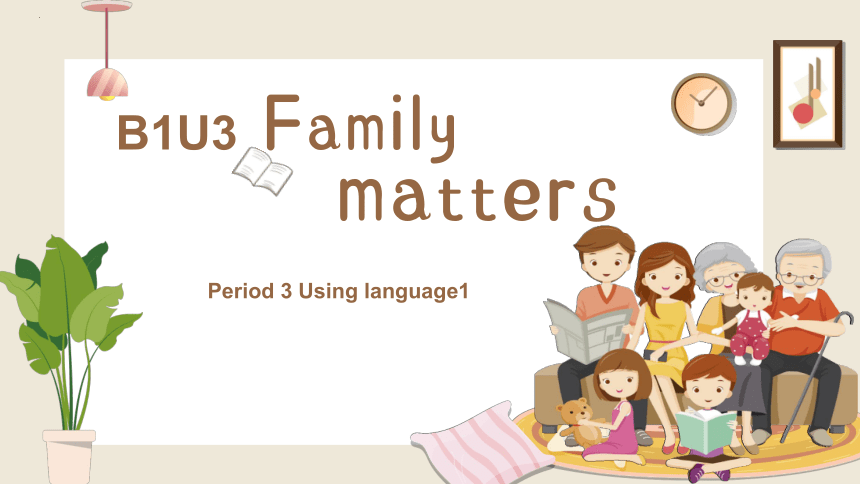 | |
| 格式 | pptx | ||
| 文件大小 | 40.9MB | ||
| 资源类型 | 教案 | ||
| 版本资源 | 外研版(2019) | ||
| 科目 | 英语 | ||
| 更新时间 | 2024-09-12 11:02:09 | ||
图片预览

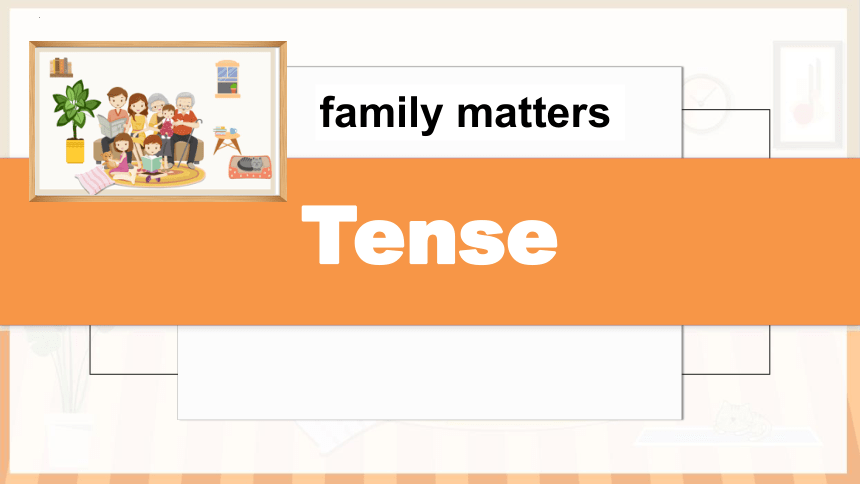
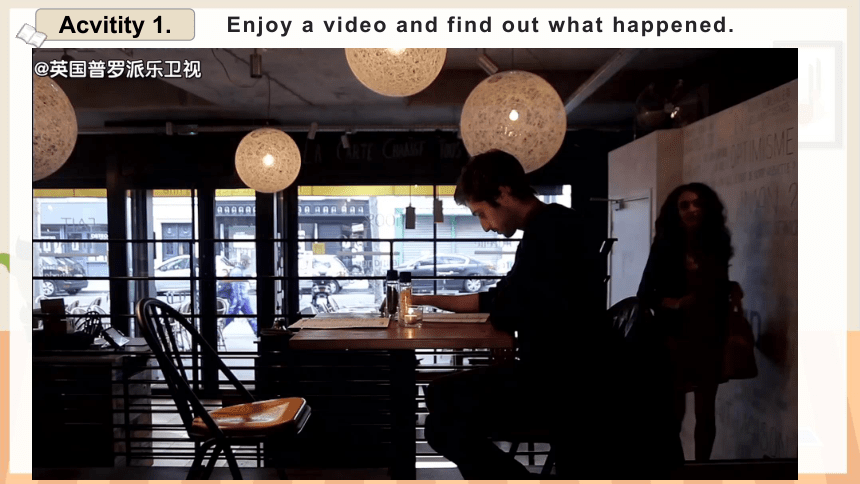
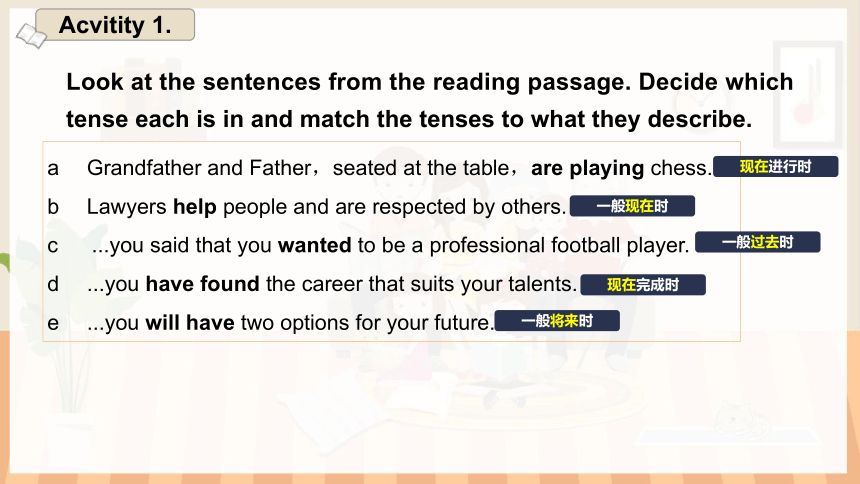
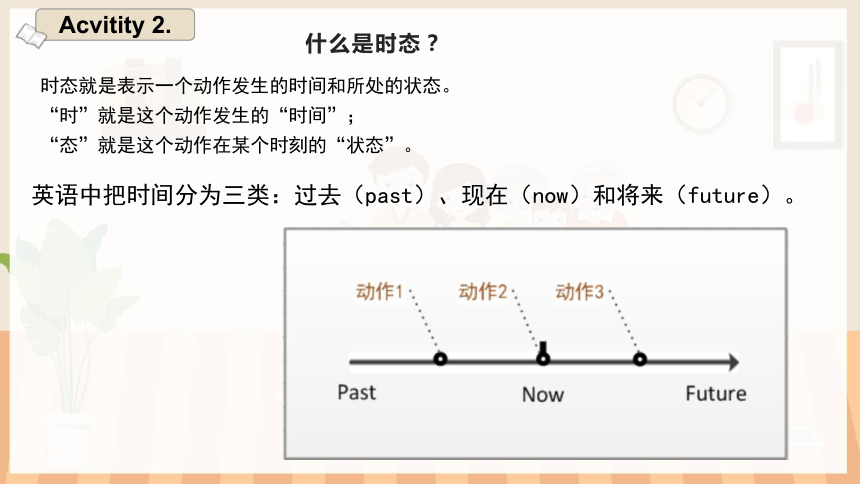
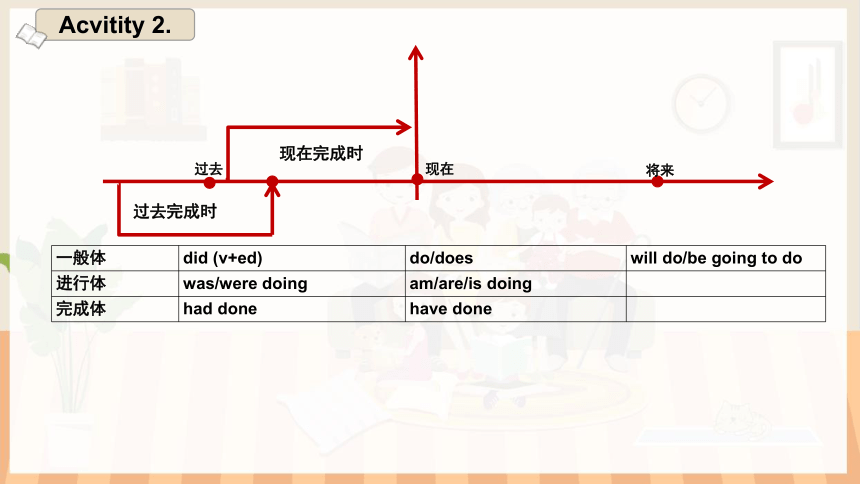
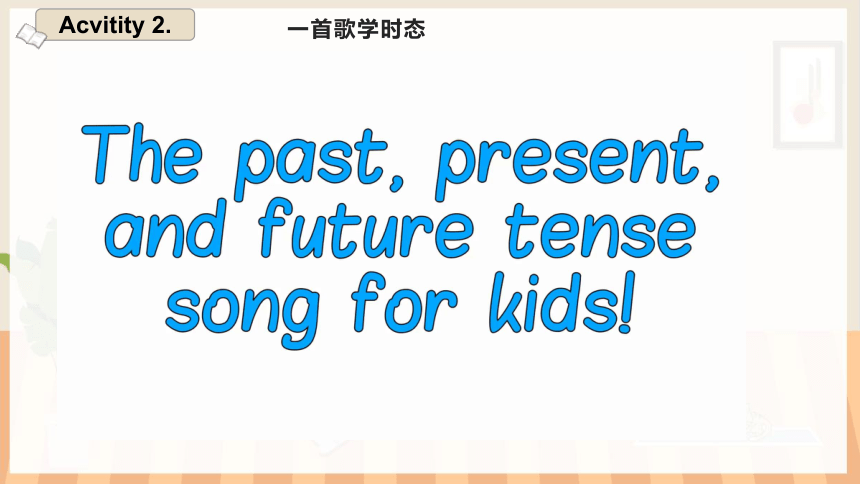
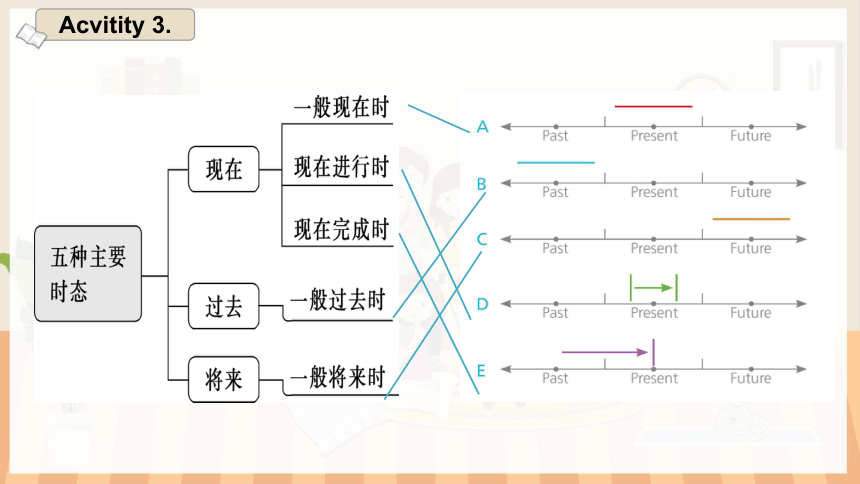
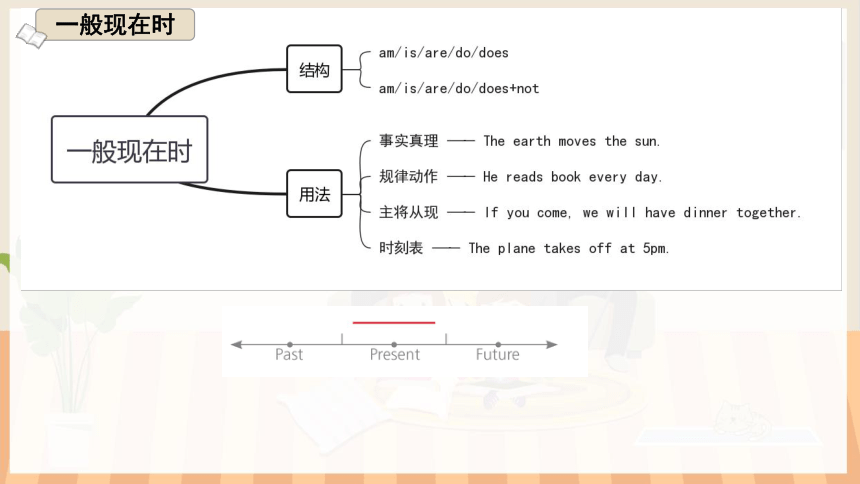
文档简介
(共22张PPT)
B1U3 Family
matters
Period 3 Using language1
Tense
family matters
Acvitity 1.
Enjoy a video and find out what happened.
Look at the sentences from the reading passage. Decide which tense each is in and match the tenses to what they describe.
a Grandfather and Father,seated at the table,are playing chess.
b Lawyers help people and are respected by others.
c ...you said that you wanted to be a professional football player.
d ...you have found the career that suits your talents.
e ...you will have two options for your future.
Acvitity 1.
现在进行时
一般现在时
一般过去时
现在完成时
一般将来时
时态就是表示一个动作发生的时间和所处的状态。
“时”就是这个动作发生的“时间”;
“态”就是这个动作在某个时刻的“状态”。
什么是时态?
英语中把时间分为三类:过去(past)、现在(now)和将来(future)。
Acvitity 2.
过去
现在
将来
一般体 did (v+ed) do/does will do/be going to do
进行体 was/were doing am/are/is doing
完成体 had done have done
现在完成时
过去完成时
Acvitity 2.
一首歌学时态
Acvitity 2.
Acvitity 3.
一般现在时
(1) 主将从现:在时间和让步和条件状语从句中,用一般现在时代替一般将来时。
When Bill comes, ask him to give me a call.
You’ll make great progress if you work hard!
(2)表示按规定、计划或时间表将要发生的事。常用的动词有:go, come, leave, start, begin, open, close, arrive等,其后常跟表示将来的时间状语。
The plane takes off at 8:00 this evening.。
Attention:
一般现在时
条件 规则 示例
一般情况
+ s
run --
runs
以ch、sh、s、z、x或o结尾
+es
fix --
fixes
辅+y 结尾
y变i+es
study --
studies
动词三单变化规则
一般现在时
现在进行时
条件 规则 示例
一般情况
+ ing
work --
working
不发音的字母 e 结尾
去e + ing
use --
using
“辅元辅” 结尾
双写末尾 + ing
begin --
beginning
少数以 ie 结尾的动词
变ie为y + ing
die --
dying
现在分词变化规则
现在进行时
现在完成时
一般过去时
过去分词规则变化
规则 动词 原形 过去式 过去分词
直+ed
去e+ed
双+ed
改y为 i+ed
work
live
stop
cry
worked
worked
lived
lived
stopped
stopped
cried
cried
help
helped
helped
like
liked
liked
plan
planned
planned
study
studied
studied
一般动词
不发音e结尾
以辅音+y结尾
辅元辅,双写尾字母
一般过去时
一般将来时
Complete the dialogue with the correct form of the words and expressions in brackets.
has
called
will throw/ are going to throw
will give / am going to give
likes
am thinking of
will love
have
finished
Acvitity 4.
Look at the checklist for Grandma’s birthday party and talk about the preparations. Use as many of the tenses in Activity 1 as possible.
They have decided to throw a party to celebrate Grandma’s birthday...
They have decided to throw a party to celebrate Grandma’s birthday. They have all chosen presents for Grandma. Dad drew up the guest list on Wednesday,and he is now making the invitations. Mum will prepare food and drinks for the party on Sunday morning.
Acvitity 5.
标志词语
1、一般现在时
every time 每次
in the morning早上
once a week每周一次
twice a month每月两次
hardly 几乎不
every sunday每个周日always总是
usually通常
often经常
sometimes有时
everyday每天
2、一般过去时
ago以前
yesterday昨天
the day before yesterday前天last time上次
last night昨晚
last year去年
the other day 前几天
once upon a time曾经
once曾经
just now 刚才
3、一般将来时
tomorrow明天
the day after tomorrow后天tomorrow night明晚
next time下次
next Friday下周五
next month下个月
next term下学期
soon很快
sooner or later 迟早
at once立刻
by the end of+将来时间
4、现在进行时
look看
listen听
at this time此时
at this moment此时
at present现在
right now现在
5、现在完成时
already 已经
yet 还
just 刚才
never 从不
ever 曾经
before 以前
up to now 目前为止
so far 目前为止
for + 一段时间
since+ 时间点
in the past few years
Acvitity 6.
6. 过去完成时
by then到那时为止 by that time到那时候
before..在…之前 by the end of.到…末为止
until then直到那时 by the time+一般过去时的从句 到……时候
Acvitity 6.
常使用完成时的句型
1 . “It was/ had been+段时间+ since从句”,从句用过去完成时;
“It is/ has been+一段时间+ since从句”,从句用一般过去时。
It was ten years since we had had such a wonderful time.
我们十年没这么高兴了。
2. “ It is the first/ second/time+that从句”,从句用现在完成时;
“ It was the first/ second/time+that从句”,从句用过去完成时
It is the first time that I have been here. 这是我第一次到这里来。
The teacher said it was the first time that little John had listened so attentively.
老师说这是小约翰第一次那么认真地听讲。
3. “That/This/It is/was+the+最高级+名词+定语从句”,从句常用完成时。
This is the best film that I have ever seen. 这是我看过的最好的一部电影。
That dinner was the most expensive meal we had ever had.
那顿饭是我们吃过的最贵的一顿饭。
B1U3 Family
matters
Period 3 Using language1
Tense
family matters
Acvitity 1.
Enjoy a video and find out what happened.
Look at the sentences from the reading passage. Decide which tense each is in and match the tenses to what they describe.
a Grandfather and Father,seated at the table,are playing chess.
b Lawyers help people and are respected by others.
c ...you said that you wanted to be a professional football player.
d ...you have found the career that suits your talents.
e ...you will have two options for your future.
Acvitity 1.
现在进行时
一般现在时
一般过去时
现在完成时
一般将来时
时态就是表示一个动作发生的时间和所处的状态。
“时”就是这个动作发生的“时间”;
“态”就是这个动作在某个时刻的“状态”。
什么是时态?
英语中把时间分为三类:过去(past)、现在(now)和将来(future)。
Acvitity 2.
过去
现在
将来
一般体 did (v+ed) do/does will do/be going to do
进行体 was/were doing am/are/is doing
完成体 had done have done
现在完成时
过去完成时
Acvitity 2.
一首歌学时态
Acvitity 2.
Acvitity 3.
一般现在时
(1) 主将从现:在时间和让步和条件状语从句中,用一般现在时代替一般将来时。
When Bill comes, ask him to give me a call.
You’ll make great progress if you work hard!
(2)表示按规定、计划或时间表将要发生的事。常用的动词有:go, come, leave, start, begin, open, close, arrive等,其后常跟表示将来的时间状语。
The plane takes off at 8:00 this evening.。
Attention:
一般现在时
条件 规则 示例
一般情况
+ s
run --
runs
以ch、sh、s、z、x或o结尾
+es
fix --
fixes
辅+y 结尾
y变i+es
study --
studies
动词三单变化规则
一般现在时
现在进行时
条件 规则 示例
一般情况
+ ing
work --
working
不发音的字母 e 结尾
去e + ing
use --
using
“辅元辅” 结尾
双写末尾 + ing
begin --
beginning
少数以 ie 结尾的动词
变ie为y + ing
die --
dying
现在分词变化规则
现在进行时
现在完成时
一般过去时
过去分词规则变化
规则 动词 原形 过去式 过去分词
直+ed
去e+ed
双+ed
改y为 i+ed
work
live
stop
cry
worked
worked
lived
lived
stopped
stopped
cried
cried
help
helped
helped
like
liked
liked
plan
planned
planned
study
studied
studied
一般动词
不发音e结尾
以辅音+y结尾
辅元辅,双写尾字母
一般过去时
一般将来时
Complete the dialogue with the correct form of the words and expressions in brackets.
has
called
will throw/ are going to throw
will give / am going to give
likes
am thinking of
will love
have
finished
Acvitity 4.
Look at the checklist for Grandma’s birthday party and talk about the preparations. Use as many of the tenses in Activity 1 as possible.
They have decided to throw a party to celebrate Grandma’s birthday...
They have decided to throw a party to celebrate Grandma’s birthday. They have all chosen presents for Grandma. Dad drew up the guest list on Wednesday,and he is now making the invitations. Mum will prepare food and drinks for the party on Sunday morning.
Acvitity 5.
标志词语
1、一般现在时
every time 每次
in the morning早上
once a week每周一次
twice a month每月两次
hardly 几乎不
every sunday每个周日always总是
usually通常
often经常
sometimes有时
everyday每天
2、一般过去时
ago以前
yesterday昨天
the day before yesterday前天last time上次
last night昨晚
last year去年
the other day 前几天
once upon a time曾经
once曾经
just now 刚才
3、一般将来时
tomorrow明天
the day after tomorrow后天tomorrow night明晚
next time下次
next Friday下周五
next month下个月
next term下学期
soon很快
sooner or later 迟早
at once立刻
by the end of+将来时间
4、现在进行时
look看
listen听
at this time此时
at this moment此时
at present现在
right now现在
5、现在完成时
already 已经
yet 还
just 刚才
never 从不
ever 曾经
before 以前
up to now 目前为止
so far 目前为止
for + 一段时间
since+ 时间点
in the past few years
Acvitity 6.
6. 过去完成时
by then到那时为止 by that time到那时候
before..在…之前 by the end of.到…末为止
until then直到那时 by the time+一般过去时的从句 到……时候
Acvitity 6.
常使用完成时的句型
1 . “It was/ had been+段时间+ since从句”,从句用过去完成时;
“It is/ has been+一段时间+ since从句”,从句用一般过去时。
It was ten years since we had had such a wonderful time.
我们十年没这么高兴了。
2. “ It is the first/ second/time+that从句”,从句用现在完成时;
“ It was the first/ second/time+that从句”,从句用过去完成时
It is the first time that I have been here. 这是我第一次到这里来。
The teacher said it was the first time that little John had listened so attentively.
老师说这是小约翰第一次那么认真地听讲。
3. “That/This/It is/was+the+最高级+名词+定语从句”,从句常用完成时。
This is the best film that I have ever seen. 这是我看过的最好的一部电影。
That dinner was the most expensive meal we had ever had.
那顿饭是我们吃过的最贵的一顿饭。
